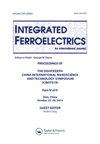Dielectric and Improved Energy-Storage Properties in A-Site Nd 3+ Doped Lead-Free 0.88NaNbO 3 -0.12Sr 0.7 Bi 0.2 TiO 3 Ceramics
IF 0.7
4区 工程技术
Q4 ENGINEERING, ELECTRICAL & ELECTRONIC
引用次数: 0
Abstract
AbstractSodium niobate (NaNbO3)-based antiferroelectric (AFE) ceramics have received significant attention for energy storage applications because of their good performance, low cost, and nontoxicity. However, the existence of the antiferroelectric P phase at room temperature causes large hysteresis, resulting in reduced energy storage efficiency. In this study, 0.88NaNbO3–0.12Sr0.7Bi0.2TiO3 ceramics doped with Nd3+ (i.e., 0.88Na1-3xNdxNbO3-0.12Sr0.7Bi0.2TiO3) at x = 0.0 − 0.025 were prepared via conventional solid-state mixed oxide route. The XRD data showed that all samples exhibited an orthorhombic structure. With increasing Nd3+ doping content, the antiferroelectric P (Pbma) phase to R (Pnma) phase transition temperature (TP-R) shifted to lower temperatures. Consistent with the dielectric properties, a transition to a relaxor-like slim P-E loop indicative of an AFE R phase was observed at the composition x ≥ 0.01. This led to an increase in both the recoverable energy-storage density (Wrec) and efficiency (η) with an increasing amount of Nd3+ doping level. The maximum recoverable energy storage density (Wrec = 0.54 J/cm3) and high energy storage efficiency (η = 93%) were observed at x = 0.025 under an applied electric field of 100 kV/cm. In addition, the optimum composition at x = 0.025 also exhibited excellent temperature stability from 25 °C to 150 °C. This research demonstrates that the NN–SBT–xNd system has the potential for use for high-energy-density pulsed power capacitor applications.Keywords: Lead-free ceramicsNaNbO3energy storage properties Disclosure StatementNo potential conflict of interest was reported by the author(s).Additional informationFundingThis work was financially supported by The National Science, Research and Innovation Fund (NSRF) through Naresuan University (R2565B059).a位Nd 3+掺杂无铅0.88NaNbO 3 -0.12Sr 0.7 Bi 0.2 TiO 3陶瓷的介电性能和改进的储能性能
摘要铌酸钠(NaNbO3)基反铁电(AFE)陶瓷因其性能好、成本低、无毒等优点在储能领域受到广泛关注。然而,室温下反铁电P相的存在会导致较大的磁滞,导致储能效率降低。本研究采用常规固相混合氧化物工艺,在x = 0.0 ~ 0.025的条件下,制备了掺杂Nd3+的0.88NaNbO3-0.12Sr0.7Bi0.2TiO3陶瓷(即0.88Na1-3xNdxNbO3-0.12Sr0.7Bi0.2TiO3)。XRD数据表明,所有样品均呈正交结构。随着Nd3+掺杂量的增加,反铁电P (Pbma)相向R (Pnma)相转变温度(TP-R)降低。与介电性质一致,在组成x≥0.01时,观察到一个类似弛豫的细P-E环,表明AFE R相。这导致可回收储能密度(Wrec)和效率(η)随Nd3+掺杂量的增加而增加。在100 kV/cm的电场作用下,在x = 0.025处可回收储能密度最大(Wrec = 0.54 J/cm3),储能效率最高(η = 93%)。此外,x = 0.025时的最佳组合物在25 ~ 150℃范围内也表现出优异的温度稳定性。该研究表明,NN-SBT-xNd系统具有用于高能量密度脉冲功率电容器的潜力。关键词:无铅陶瓷snanbo3储能特性披露声明作者未报告潜在利益冲突。本研究由国家科学研究与创新基金(NSRF)通过南京大学资助(R2565B059)。
本文章由计算机程序翻译,如有差异,请以英文原文为准。
求助全文
约1分钟内获得全文
求助全文
来源期刊

Integrated Ferroelectrics
工程技术-工程:电子与电气
CiteScore
1.40
自引率
0.00%
发文量
179
审稿时长
3 months
期刊介绍:
Integrated Ferroelectrics provides an international, interdisciplinary forum for electronic engineers and physicists as well as process and systems engineers, ceramicists, and chemists who are involved in research, design, development, manufacturing and utilization of integrated ferroelectric devices. Such devices unite ferroelectric films and semiconductor integrated circuit chips. The result is a new family of electronic devices, which combine the unique nonvolatile memory, pyroelectric, piezoelectric, photorefractive, radiation-hard, acoustic and/or dielectric properties of ferroelectric materials with the dynamic memory, logic and/or amplification properties and miniaturization and low-cost advantages of semiconductor i.c. technology.
 求助内容:
求助内容: 应助结果提醒方式:
应助结果提醒方式:


